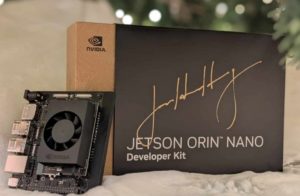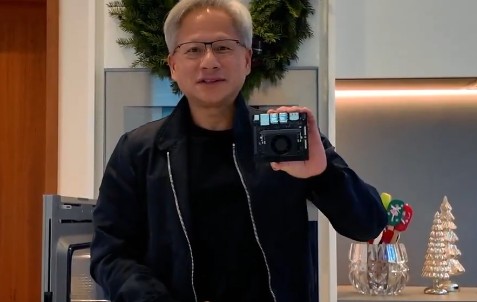SANTA CLARA/USA – In a groundbreaking move that could redefine the landscape of artificial intelligence and robotics, NVIDIA has unveiled its latest innovation—a compact AI supercomputer designed to deliver a staggering 70 trillion operations per second (TOPS) at an accessible price of just $249. This pocket-sized powerhouse is poised to revolutionize industries ranging from robotics and autonomous systems to large language models (LLMs) and edge computing.
Unmatched Power in a Tiny Package
The new AI supercomputer, dubbed NVIDIA Jetson Nano 2.0, is engineered to provide high-performance computing in a form factor that fits in the palm of your hand. Despite its small size, it delivers exceptional computational power, making it a game-changer for developers working on AI-driven applications. Whether it’s autonomous drones, robotics, or AI-based automation, this supercomputer can handle demanding tasks at a fraction of the cost and size of traditional systems.
At a breakthrough price of $249, NVIDIA’s Jetson Nano 2.0 opens up new possibilities for startups, research institutions, and businesses looking to leverage AI without breaking the bank. With the ability to execute 70 trillion operations per second, it provides the raw processing power required for real-time machine learning, advanced image recognition, and seamless integration with LLMs.

NVIDIA CEO Jen-Hsun Huang placed this revolutionary product under its Xmas tree
Market Disruption and Industry Impact
This new supercomputer has the potential to disrupt a variety of industries. In robotics, for instance, it can enhance autonomous vehicles, drones, and other machines with AI capabilities, enabling more efficient operations and smarter decision-making. With the rise of generative AI and LLMs, this computing power will be critical for training and running cutting-edge models for natural language processing and understanding.
Furthermore, the shift toward edge computing will benefit from this innovation, as it enables AI to be deployed closer to data sources, reducing latency and improving performance for real-time applications. The automotive, healthcare, manufacturing, and logistics industries are expected to be among the key beneficiaries, enabling AI-driven advancements that were previously out of reach due to cost and hardware limitations.
Will U.S. Export Laws Impact the New AI Supercomputer?
While introducing this tiny, powerful supercomputer marks a major technological advancement, questions are already emerging about the impact of U.S. export laws on its international distribution. Given the sensitive nature of advanced computing technology, particularly in AI and machine learning, NVIDIA’s new product could face restrictions due to American export laws, which tightly regulate the sale of cutting-edge chips and technologies to certain countries, including China and other geopolitical adversaries.
The U.S. government has long maintained stringent regulations on the export of high-performance computing chips to countries considered a national security threat. As a result, this new AI supercomputer could be subject to scrutiny and restrictions, particularly in markets where advanced AI technology could potentially be used for military or surveillance purposes.
NVIDIA, which has faced challenges in navigating export regulations in the past, may need to comply with these laws and may be required to impose limitations on sales to specific regions. Whether or not this new product will be widely available in countries like China remains to be seen, but its global reach could be significantly impacted by these regulations.
Availability and Pricing
The NVIDIA Jetson Nano 2.0 is now available for pre-order through NVIDIA’s website and select distributors. At a price of $249, it offers an unprecedented value for AI developers and businesses looking to innovate in fields such as robotics, automation, and AI-driven applications. The supercomputer will be delivered with a full suite of software tools to support a wide range of applications, ensuring that developers can get started immediately.
With its small size, massive processing power, and affordable price point, NVIDIA’s latest innovation is poised to be a transformative force in the world of artificial intelligence. However, its global success may be contingent on how U.S. export laws evolve and whether restrictions will limit its international impact.
As industries around the world race to incorporate AI into their operations, NVIDIA’s new supercomputer offers a tantalizing glimpse into the future of computing—one that is faster, smaller, and more accessible than ever before. (hz) – Photos: NVIDIA

